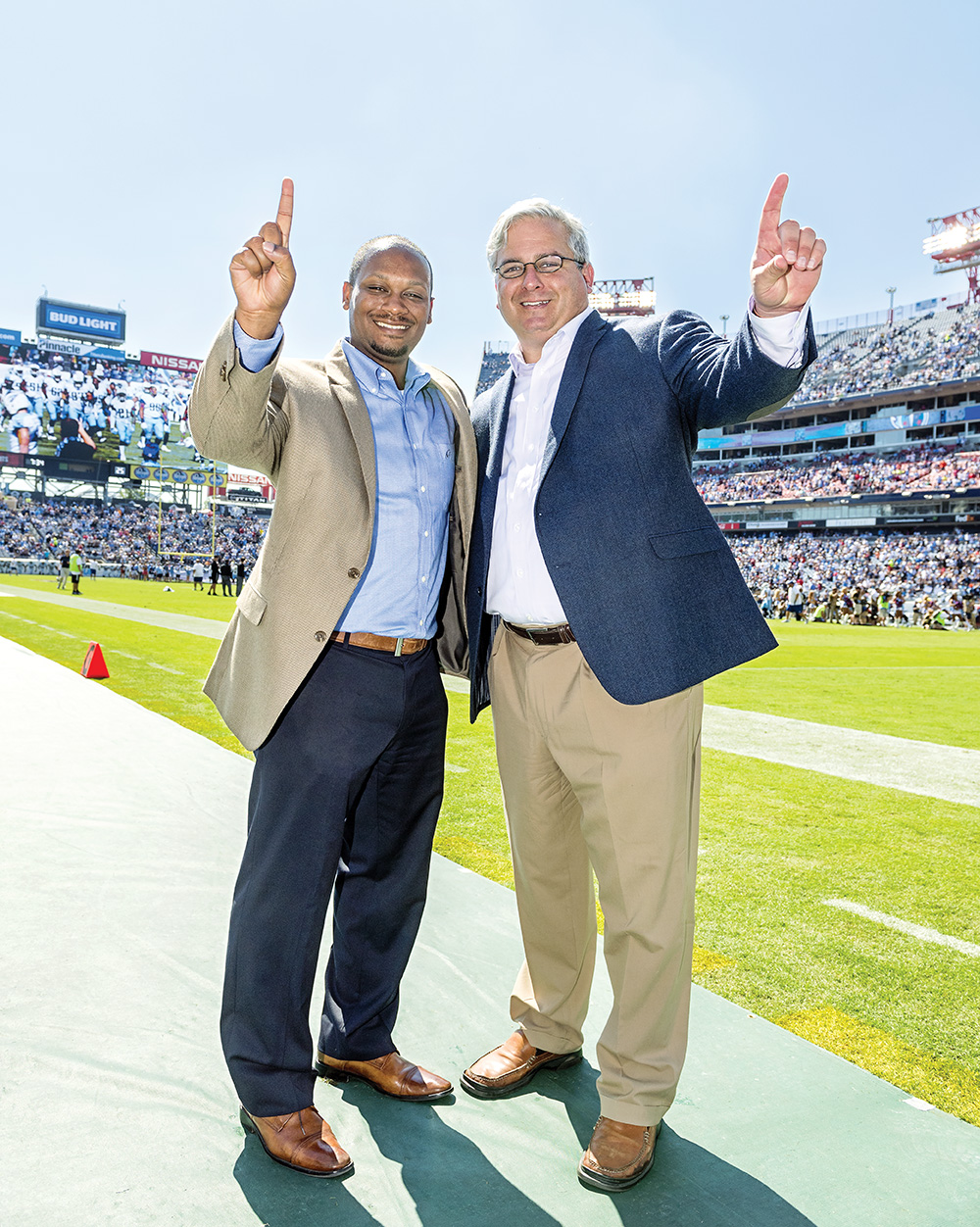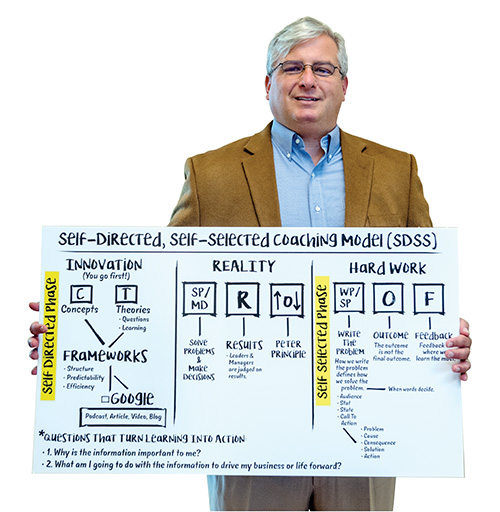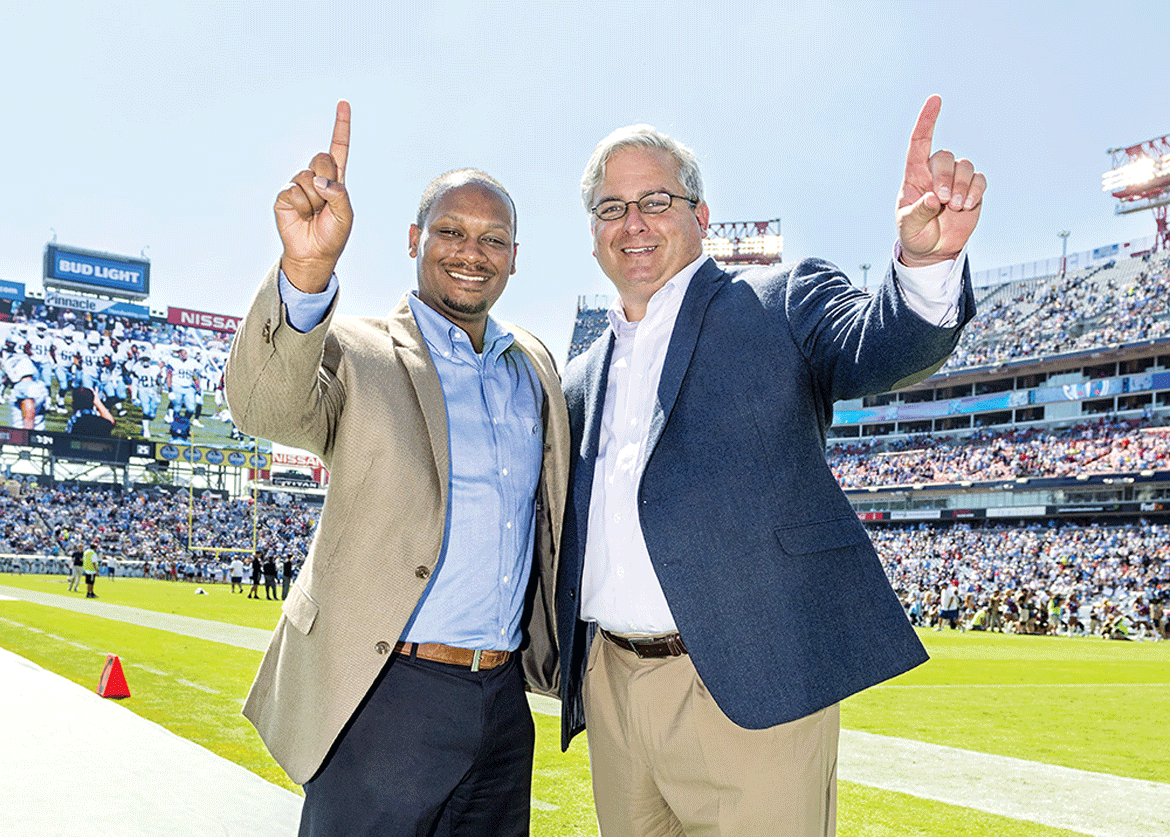Professor Colby Jubenville’s formula for graduates’ success results in remarkable professional achievements by MTSU alumni like Anthony Dudley
By Allison Gorman
MTSU Leisure and Sport Management graduate Anthony Dudley (’12) freely admits he did the bare minimum to pass classes and earn his undergraduate degree in English from Florida State University. Two years after graduation, at a standstill in his professional career, he decided to enroll in the master’s program at MTSU to pursue his true passion—sports.
Dudley said he learned three important lessons while at MTSU that allow him to have success today: core values, perseverance, and a personal skill set—all of which he credits to Health and Human Performance professor Colby Jubenville.
“Dr. Jubenville is probably the most unique and passionate person I have ever met,” Dudley said. “He exposes his students to things that you are not taught anywhere else.”
Dudley is living proof that Dr. Jubenville’s model for coaching students to achieve their professional dreams and enter the workforce prepared for success is working. Dudley is currently senior director of development for the Nashville Sports Council and Franklin American Mortgage Music City Bowl, the postseason college football bowl game that serves as that prominent organization’s premier annual event.
Similar student stories abound regarding Jubenville’s teaching methods at MTSU.
Patrick Nowlin (’10) remembers being “a kid with long hair and a bad attitude” when he first met Jubenville. For his part, Jubenville remembers Nowlin as a student with good potential but lacking direction, certainly not on track for a career in the competitive field of sport management. Both of them say a 2009 meeting was a game-changer.
Jubenville, who pioneered the sport management program within MTSU’s College of Behavioral and Health Sciences (CBHS), recalls catching Nowlin off guard with some tough questions: “Who are you waiting on permission from to be successful? Why are you sitting here wasting your time and wasting my time? Why did you go to college in the first place?”

Over the next year and a half, Jubenville prodded, pushed, and ultimately empowered Nowlin to succeed.
“He saw who I could be and not what I was,” Nowlin said. “He would highlight your strengths and make you feel 10 feet tall when you got praise from him, but he also provided corrective criticism to help you get better. He truly cared about you as a person and wanted nothing but the best from all his students.”
Jubenville has been getting the best from his students since he began building up the Leisure and Sport Management master’s program in 2001. Graduates from the Sport Industry concentration now occupy front-office positions in top-tier franchises like the Houston Astros, Tennessee Titans, and Talladega Motor Speedway, just to name a few.
Nowlin, now regional manager for IMG Learfield Ticket Solutions, which handles athletic ticket sales for colleges across the country, compared Jubenville’s methods to a fine scotch.
“It’s hard to handle at first, and you may not like it,” he said, “but the older you get, the more you realize how good it is.”
MAN ON A MISSION
As Jubenville describes it, the transformative process sounds more like career boot camp.
“I know it works because I’ve replicated it year after year,” he said. “I’ve taken kids with no confidence and no focus and no intention and stripped them down and built them back up, and now they’re rock stars in the sport industry.”
All those success stories caught the attention of CBHS Dean Terry Whiteside, who now offers Jubenville’s one-on-one mentoring throughout his college. In 2015, Whiteside named Jubenville as special assistant to the dean for student success and strategic partnerships. The college’s recently launched Center for Student Coaching and Success (CSCS), located in the new Miller Education Building on Bell Street, now represents an official space for Jubenville to do what he’s been doing unofficially for the last 15 years.
As Jubenville sees it, the new center represents MTSU upholding its end of a sacred bargain, one in which students bet their money, time, and resources that colleges have what it takes to “get them in the game.” However, Jubenville argues, colleges usually don’t make good on that bet. Instead, he said, traditional higher education focuses too much on imparting information and not enough on building the critical skill set through which students gain confidence and become self-directed.
“There’s an old saying, ‘You can’t give away what you don’t have,’” Jubenville said. “These kids are starved for somebody to show them the way. And so I teach them.”
At the heart of that instruction is helping students systematically bridge what Jubenville calls a “challenging gap” between approaching graduation, finishing college, and securing gainful employment.
“My whole focus at MTSU over the last 15 years is about helping students find their voice, and voice is the intersection of talent, passion, conscience, and need in the world,” he said.
Jubenville begins by helping students understand the difference between employment (“trading time for money”) and gainful employment (“gaining psychological satisfaction from the work you do”). He then helps them achieve gainful employment by identifying where they want to go and taking actionable steps to get there. In the process, he teaches them how to separate themselves from their competition by enhancing their knowledge, skills, desire, confidence, likeability, and network, as well as their “unique perspective” on the world. (See the sidebar titled “The Center of it All” for more specifics on Jubenville’s teaching approach in the center.)
One of the first questions he asks students is “Where are you from?” because he believes the answer reveals a foundation for that unique perspective. Jubenville (as he’s quick to point out) is from coastal Alabama, where residents celebrate “the jubilee,” a periodic phenomenon that causes crab, shrimp, and other seafood-to-be to swarm the beaches of Mobile Bay.
“I’m from Mobile . . . on the bay, people can literally walk down to the shore and pick up the abundance from the Gulf of Mexico,” he said. “It’s important for somebody to understand that, because that’s what I believe about life, that’s what I believe about opportunity.”
SELF-MADE MAN
With his liquid accent, contagious fervor, and colorful language, Jubenville might have made a good preacher at a tent revival. Instead, he initially applied his skills set to another great Southern tradition: coaching football.
He played the game first, as a defensive lineman at Millsaps College in Jackson, Mississippi. Then, as a young faculty member at Belhaven University in Jackson, he helped build an NAIA football program from the ground up.
“No phones, no computers, no players, no uniforms—just a dream,” he said. “We ended up ranked in our first season.”
Because the job required too much time away from his children, Jubenville retired from coaching football. But he never stopped coaching people, and football still informs his unique perspective.
“The idea of using adversity to accelerate your growth, the idea of
how to handle sudden change—those were born out of my coaching background,” he said.
According to Jubenville, students—like football players—respond best to individualized coaching. Some, like his former student Jon Salge, simply require steady cheering from the sidelines.
Salge was already a scout for the Titans when he realized he needed the professional advantage of an advanced degree. He said Jubenville talked him through all the logistical concerns—“I won’t have as much time with my wife, I’ll be tired, it costs money, it’s a pain in the rear end to drive to Murfreesboro”—that had kept him from enrolling in MTSU’s sport management graduate program.
Over the next two years, Jubenville urged Salge forward with constant support and reminders of how valuable that master’s degree would be.
After 10 seasons with the Titans, Salge still benefits from Jubenville’s coaching.
“There are conversations he and I had that I still look back on today if I need a little extra push to get through a difficult challenge or task,” Salge said.
While he credits Jubenville with making him see his dream through to fruition, Jubenville said Salge just needed a nudge to get his dream off the ground.
“That’s what great coaches do for you,” Jubenville said. “First, they make you have conversations that you don’t want to have. Second, they make you do things you don’t think you can do.”
“And third,” Jubenville said, “they open doors you don’t know how to open.”
Jubenville did all three for Michael Gallagher, who had aspirations of being a great sports writer—and a great idea for a blog.
Gallagher talked about the blog a lot, Jubenville recalls.
“Finally I said, ‘I’m tired of hearing about this idea for a blog. Start writing a blog.’ And so he wrote it, and some of the stuff he wrote was really good,” Jubenville said.
One day Gallagher showed up in Jubenville’s office visibly frustrated; he needed to secure an internship but had no idea how to do it. Jubenville called his friend David Boclair, a senior sports writer for the Nashville Post, and invited him to lunch. He took Gallagher along. At the end of lunch, Jubenville asked Boclair to give Gallagher a shot.
That shot eventually became a paying gig, with encouraging feedback from Boclair to Gallagher—
It amazes me how much better you get every time you write. . . . I think if I start to give you 10 items a week to write, you could be a Pulitzer Prize winner by Christmas.
—who sent this e-mail to Jubenville:
Thank you again for everything you have done for me. I can say without a doubt that I am in the right career, meeting the right people, and doing what I love.
Those results were worth the lunch tab, Jubenville said. “Hey, if it costs me 80 bucks for a kid to get in the game, I’ll spend the 80 bucks. I’ll get him in the game,” Jubenville said.
Getting kids in the game has been critical to the sport management program since day one. Networking is how careers are launched and furthered, Jubenville said, and it should start in college, facilitated by faculty.
“If you want to build a great program, you must first build great opportunities, because great opportunities will bring in the great students,” he said.
And so Jubenville spent his first two years at MTSU building sport industry relationships in middle Tennessee and beyond. By year three, those relationships were bearing fruit for his students.
Along the way, Jubenville has practiced what he preaches and strengthened his own professional network. He has become a sought-after international speaker and consultant and racked up high-profile honors like the Nashville Business Journal’s 40 Under 40 award and the Nashville Emerging Leaders Impact Award from the Nashville Area Chamber of Commerce, an award honoring an individual dedicated to community leadership and professional development.
“I’m very fortunate to be part of a community like middle Tennessee,” Jubenville said. “I tell people all the time you can sell used chewing gum in Murfreesboro and make money, and along the way I’ve met some key people that are drivers of the economy.”
MAN WITH A PLAN
Jubenville counseled one of those drivers, John Floyd, owner of Ole South Properties—which recently constructed its 10,000th home—through the economic downturn of 2008. In return, eight years later, Floyd recently pledged $1 million to help launch the aforementioned Center for Student Coaching and Success at MTSU. Half of that pledge has already been delivered to the University.
Floyd said he strongly believes in the work the center will accomplish.
“The vision is that students will become gainfully employed even before walking across the graduation stage,” he said.
“This is about getting laser-focused and intentional about the career path these students want to create for themselves and starting down that path while they are still in school—not the day they graduate.”
Dean Whiteside said Floyd’s gift enables his college to give more than lip service
to MTSU’s University-wide mantra of ensuring student success.
“This enables us to take students beyond a traditional college education, to make them more impressive in job interviews, teach them how to market themselves, how to understand themselves and others, and to be more influential and persuasive,” he said. “This takes student success beyond graduation.”
Additional major gifts are in the works that will bolster the new center’s size and scope. MTSU President Sidney A. McPhee has expressed his desire to raise additional funds for the center that would enable Jubenville to expand the size and scope of his student mentorship program campus-wide.
Jubenville’s approach well reflects McPhee’s vision to seize the opportunity to innovate, transform, and lead the way in creating a new model for higher education. The
center’s creation, in fact, aligns perfectly with a major initiative McPhee launched in 2013—the MTSU Quest for Student Success—a plan emphasizing student retention and graduation over sheer enrollment and which aims to make MTSU students successful even beyond their years at
the University.
The goals of the Quest, and of the new center, in turn align perfectly with the new state funding formula for colleges, as well as Gov. Bill Haslam’s Drive for 55 initiative aimed at increasing the number of Tennesseans with degrees and certifications to 55 percent. Doing so, the governor has said, is crucial to meeting the workforce demands of the coming decades.
Right now, the center is benefitting from Jubenville’s network. But done right, the center will create its own beneficial network of gainfully employed graduates, Jubenville said.
“If they want to come back and speak, if they want to write a check, if they want to hire our students,” he said, “that’s what success looks like to me.” MTSU
THE CENTER OF IT ALL

When students step into the new Center for Student Coaching and Success located in the new Miller Education Building, they’ll know it means business, said Colby Jubenville, the College of Behavioral and Health Sciences’ special assistant to the dean for student success and strategic partnerships. The space reflects the corporate America where grads hope to land.
Through individual, peer, and group coaching sessions, Jubenville said the center will help students make the leap from college to career by developing their knowledge, skills, desire, confidence, likeability, and networks, allowing them, in Jubenville’s words, to “win in the marketplace of ideas.” They do so by focusing on five areas, which Jubenville labels “The Five to Arrive”:
- Academic skills and critical thinking: Students will learn Jubenville’s Self-Directed, Self-Selected coaching model to learn to effectively solve problems and make decisions, just as they will be expected to do on the job.
- Emotional intelligence: Studies have shown that the ability to identify and manage your own and others’ emotions is the strongest predictor of workplace performance, Jubenville said.
- Personal branding: Using materials from Me: How to Sell Who You Are, What You Do, and Why You Matter to the World, a book Jubenville co-wrote with MTSU business professor Dr. Don Roy, students will create a personal brand for a competitive edge.
- Persuasion: Students will be exposed to concepts and theories that will help them influence others.
- Career development: Partnering with the MTSU Career Development Center, students can complete personality/career assessments, develop their resumes, train for interviews, and take advantage of new technologies like CareerShift and Career Clustering.
Visit the center’s website at mtsu.edu/cbhssuccess/ for more information.
THE MAN BEHIND THE GIFT
John Floyd started his career in real estate in 1986 at the age of 23. His Murfreesboro company, Ole South Properties, recently completed construction of its 10,000th home and averages building a whopping 650 to 825 homes annually.
In 2008, Floyd was honored as the Nashville Business Journal’s Entrepreneur of the Year. Other professional accolades include being named Tennessee Home Builder of the Year by the Home Builders Association of Tennessee and being recognized by the Tennessee Housing and Development Agency as the Builder of the Year for 2012, ’13, and ’14.
 Floyd has consistently parlayed his success in business into an opportunity to give back to the community he lives in. With the creation of the John Floyd Charitable Foundation, well in excess of $1 million in financial, material, and labor support has already been given to various organizations throughout middle Tennessee. For example, in partnership with the Rutherford County Home Builders Association, Floyd recently led an effort to renew the building trades vocational program at Oakland High School, a project designed to replenish the skilled labor workforce in middle Tennessee. Ole South is also actively involved in the Academy of Architecture and Construction at Nashville’s Cane Ridge High School, among numerous other civic organizations.
Floyd has consistently parlayed his success in business into an opportunity to give back to the community he lives in. With the creation of the John Floyd Charitable Foundation, well in excess of $1 million in financial, material, and labor support has already been given to various organizations throughout middle Tennessee. For example, in partnership with the Rutherford County Home Builders Association, Floyd recently led an effort to renew the building trades vocational program at Oakland High School, a project designed to replenish the skilled labor workforce in middle Tennessee. Ole South is also actively involved in the Academy of Architecture and Construction at Nashville’s Cane Ridge High School, among numerous other civic organizations.
Floyd said his gift to create the Center for Student Coaching and Success at MTSU represents the organic relationship between the University as an economic driver for the region and the success his company has enjoyed as a provider of affordable housing throughout middle Tennessee.
“It comes around,” Floyd said. “I’m just reinvesting in the community. I’ve done extremely well in this community, and MTSU in many ways represents a lot of my success.”
The close relationship between Floyd and Jubenville also played a crucial role in the development of the gift. According to Floyd, Jubenville helped him “think differently” about the 2008 recession that devastated many home builders.
“We all have challenges, and when you work through those challenges together, it forms a bond,” Floyd explained.
Floyd later attended some of Jubenville’s on-campus classes where he was able to witness the professor’s decidedly out-of-the-box approach to inspiring and developing his students through an emphasis on specific knowledge that will help them get into a career. Once Floyd saw Jubenville had a formula that worked and a proven track record of student success, he said he “got on board.”
“John is in it for the greater good,” Jubenville said. “He likes to see people make an investment in themselves that will pay dividends for the rest of their lives.”


COMMENTS ARE OFF THIS POST